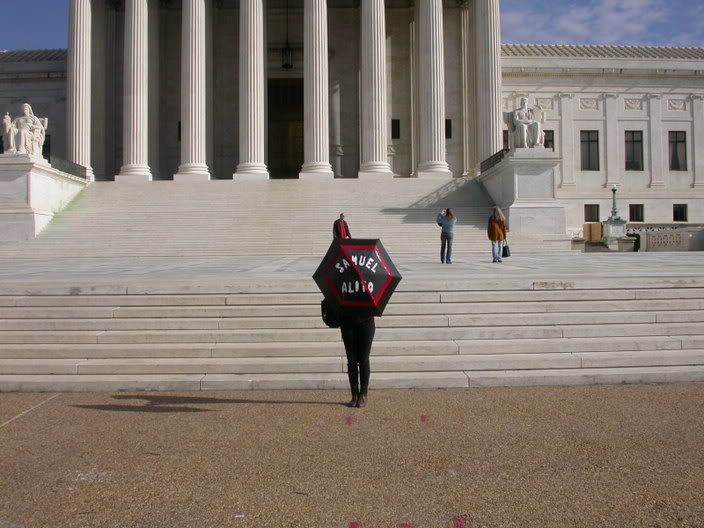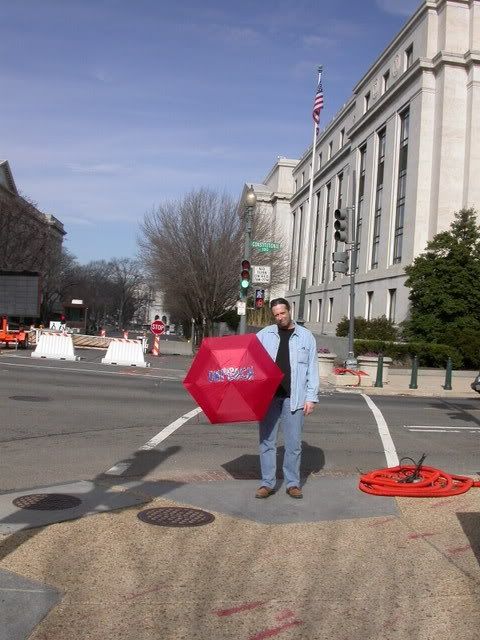Update [2005-12-16 9:21:25 by tampopo]:
Now available:
Diary for Day 2,
Diary for Day 3,
Diary for Day 4,
Diary for Day 5, Diary for Day 6, Diary for Day 7, Diary for Day 8, and Diary for Day 9
*Continuing Action*: After the Diary for Day 12 is available, print them all and make books to handout from Dec. 23rd to Jan. 9.
Do what you can with what has been put together – small actions add up.
Some thoughts: I would like to offer a couple of variations of the diary for people to be able to choose, graphics hosted by Connecticut Man 1 will be in the comments.
There is no “right” way. Your involvement, sending something is what is most important.
Please feel free to amend, to adapt, to personalize this message.
Three groups to contact:
your senators, the Judiciary Committee, and your representatives
December 12, 2005
You should be very wary of Judge Samuel Alito. Perhaps afraid is more accurate.
Judge Samuel Alito does not respect the primary role of the Legislative branch of our government. Therefore, he should not be considered acceptable to any member of Congress, particularly true Conservatives, regardless of his opinions on other matters held dear.
Judge Alito is a threat to your role in the structure of our government. You practice the art of politicking, balancing constituents’ concerns and needs with those of our society as a whole. Legislation is challenged in court, as it should be when the interpretation of a law is in question. Judge Alito’s record suggests he is not a “strict constructionist” of the Constitution.
Norm Ornstein, of the prestigious American Enterprise Institute, has recognized the danger Judge Alito represents. In his article, “Judge Alito Doesn’t Show Congress Enough Deference,” Ornstein states:
[Supreme Court Justice John] Roberts respects Congress and its constitutional primacy; Alito shows serious signs that he does not…
…Roberts is a very conservative guy, and a strict constructionist — one who means it. He understands that Congress is the branch the framers set up in Article I, Section 1 of the Constitution. It is not coincidence that Article 1 is twice as long as Article II, which created the executive branch, and almost four times as long as Article III, which established the judiciary. Judges should bend over doubly and triply backward before overturning a Congressional statute, especially if it is clear that Congress acted carefully and deliberatively…
The court case that has Mr. Ornstein turning such a critical eye on Judge Alito is from 1996, “United States v Rybar.” This case involved a challenge to Congress’s right to regulate the possession or transfer of machine guns.
From Mr. Ornstein,
Congress had passed the law in a reasonable and deliberate fashion. A genuine practitioner of judicial restraint would have allowed them a wide enough berth to do so. Alito’s colleagues did just that. But Alito used his own logic to call for its overturn, arguing that the possession of machine guns by private individuals had no economic activity associated with it, and that no real evidence existed that private possession of guns increased crime in a way that affected commerce — and thus Congress had no right to regulate it. That kind of judicial reasoning often is referred to as reflecting the “Constitution in Exile.”
Whatever it is, it’s not judicial restraint.
In response to Alito’s opinion, the majority said, “Nothing in Lopez (an earlier Supreme Court case) requires either Congress or the Executive to play Show and Tell with the federal courts at the peril of invalidation of a Congressional statute.”
Mr. Ornstein’s final sentence is a caution to you,
Whatever else it does with Judge Alito at the confirmation hearings, the Senate needs to hold his feet to the fire on this larger issue of deference to the legislative branch.
Don’t let Judge Alito’s opinions on single issues distract you from the danger he presents to our nation’s Constitutional foundation. Reject his nomination and encourage your colleagues to do the same.
A Concerned Citizen and Registered Voter,




